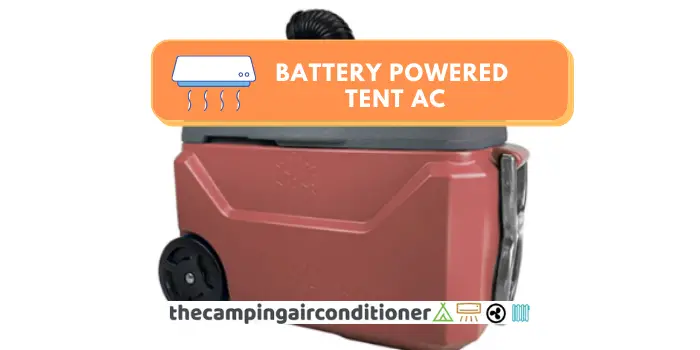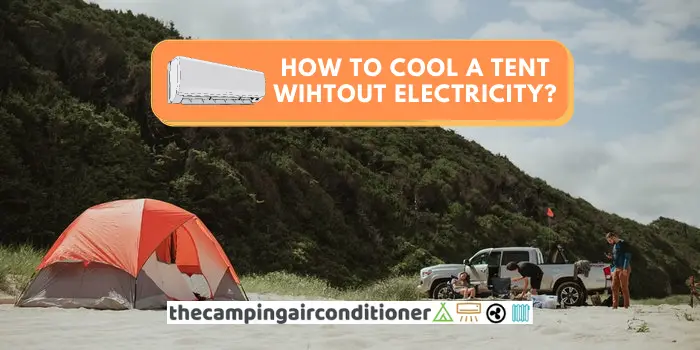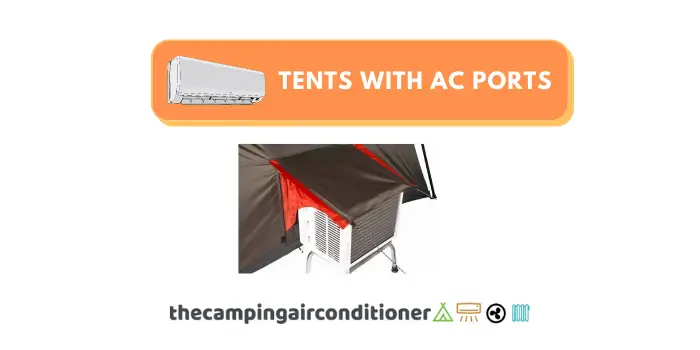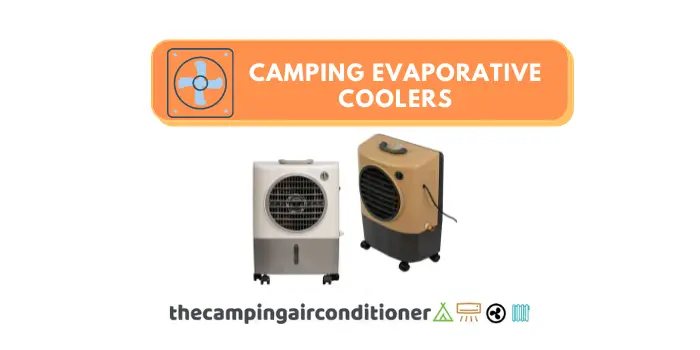Summer is the preferred camping season for many people. Long days, plenty of sunlight, and perfect weather conditions to pitch are an ideal combination for a camping trip!
However, temperatures can significantly increase and become a worrying factor in some sites. For example, the National Park Service website advises that temperatures in the Yosemite Valley can reach 100°F on summer days. A natural question arises then: how hot is too hot for camping?
The exact temperature that the human being can support heavily depends on air humidity levels. In a nutshell, the higher the humidity levels, the less capable a person will be of handling high temperatures.
Recent research has shown that the human being can support up a wet-bulb temperature of 95°F. But what is a wet-bulb temperature? We have done a thorough investigation to understand it and detail it below – let’s go through it.
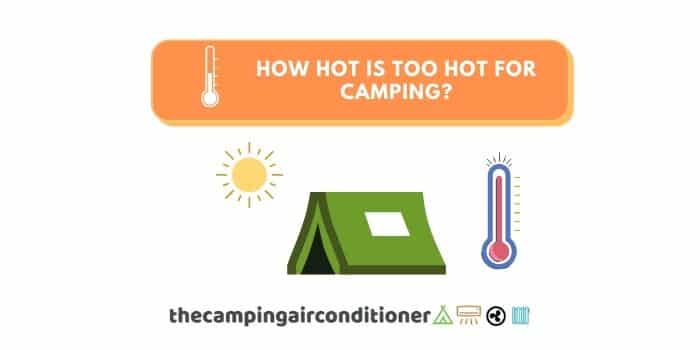
By the way, The Camping Air Conditioner is sponsored by readers. When you buy through one of our links, we may earn an affiliate commission at no extra cost to you.
What is the wet-bulb temperature and why it is important for campers?
Web-bulb temperature is a theoretical measure that combines humidity and temperature levels into one value. It represents the lowest temperature at which the air can be cooled through water evaporation.
Its measurement occurs by wrapping a wet wick around the bulb of a mercury thermometer and measuring what temperature it reaches. However, for your convenience, there are multiple options for wet-bulb thermometers these days – you don’t need a thermometer and a wet wick.
Our body promotes heat loss via evaporation and we sweat to freshen and regulate the temperature of our organism. However, our sweating capacity might be affected by the presence of water in the air.
The higher water concentration, the more our body will struggle to cool down (That explains why dry heat feels more tolerable than extreme humidity!). For this reason, the concept of wet-bulb temperature is very important to understand how hot is too hot for a person.
Before going on your next trip, remember to check both humidity levels and temperatures since they might significantly impact your comfort. Check the video below if you want a detailed explanation of the web-bulb temperature concept – it is a very didactic video!
How hot is too hot for camping then?
The maximum wet-bulb temperature that a human body can tolerate is 95-degrees Fahrenheit, and (wet-bulb) temperatures above 86°F are already considered dangerous.
Some symptoms that indicate you are close to reaching the maximum your body’s limits are:
- Feeling dizzy or light-headed
- Having a dry throat (might indicate dehydration)
- Severe headache that relieves when you go under the shade
The human body has mechanisms that offer remarkable resilience in hot weather. However, high humidity levels will hinder sweating, make it difficult for a camper to support heat waves, which can lead to heat hyperthermia.
What is heat hyperthermia?
Hyperthermia is a serious condition that occurs when your body temperature is extremely high. It refers to different conditions when the body’s heat regulation system is overwhelmed by circumstances that it cannot control.
The average body’s temperature ranges from 96 to 99.5°F and temperatures outside this interval should trigger an alarm. If your organism temperature is above 104°F, you might experience severe hyperthermia. By contrast, a body temperature of 95°F or lower is said to be hypothermic.
Hyperthermia comes in different stages, and each stage has symptoms that require serious medical attention and care. Some hyperthermic conditions and heat-related effects on your body include:
- Fatigue
- Stress
- Cramps
- Exhaustion
- Low blood pressure
How to Cool your Body while camping?
During the summer, temperatures can skyrocket!
Knowing how to cool your body ensures you are comfortable and helps you avoid dehydration, headache, and other serious complications, such as heart stroke.
No matter where you are camping in the summer, there are ways to combat the heat and cool your body.
Here are essential tips that will help cool your body in the summer.
- Stay hydrated – Drinking water is crucial to staying cool while camping in hot weather. The circulatory system carries heat from vital organs and muscles to the skin when it is hot. You begin to sweat, and sweat evaporation is the main way the body loses heat. This explains why you sweat a lot when it is hot. So, drink a lot of fluids if you want to keep your body cool.
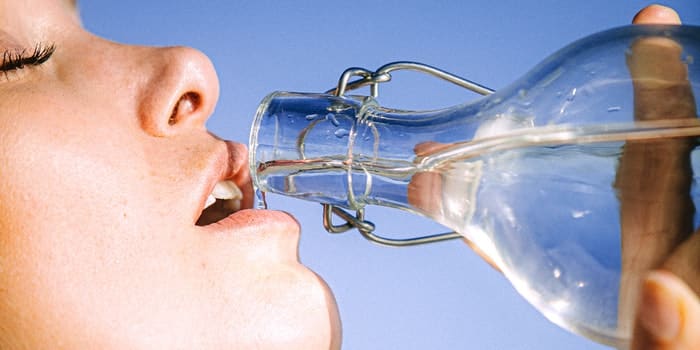
- Eat foods high in water content – Foods high in water content will keep you hydrated. Fruits such as watermelon, cantaloupe, and strawberries are good alternatives. Eat lots of vegetables, such as cauliflower, cucumber, and celery.
- Use light-breathable clothes – Avoid wearing clothes that make you feel uncomfortable. Play cool with sunglasses or a hat with a wide brim. Also, you can carry an umbrella or parasol for sun protection. Wear loose, light-coloured clothes in natural fabrics.
Other essentials tips to cool yourself include:
- Plan your trip ahead and check weather conditions.
- Set up your tent under the shade
- Pick a tent for hot weather – we have reviewed some models in this post
- Pitch your tent in a ventilated area
- If possible, disassemble it during the day.
How to cool your tent while camping?
Getting better comfort in tents is our speciality – we have prepared a bunch of tips for you, such as:
- Choose the adequate tent fabric and preferably a light-coloured option
- Set your tent up at the right time
- Insulate your tent
- Consider a tent air conditioner or a solar-powered fan.
- If your campsite is not humid, consider an evaporative cooler.
- A battery-powered AC is an excellent alternative if you don’t have an electric hookup around your tent.
- If on a budget, consider a DIY AC – cheap and easy to build.
If you want to learn more about these tips, we suggest reading the articles below.
FAQ
Is it safe to go camping on summer days?
Yes, there are no problems. Summer is actually the best season for camping, in our opinion. We suggest having a wet-bulb thermometer to monitor temperatures and avoid crossing the 95 Fahrenheit threshold (wet-bulb).
Why do tents get so hot?
Extremely hot tents are a consequence of trapping warm air inside it. This occurs because of the following reasons:
- Excessive sun exposure
- Lack of air circulation / ventilation
- Incorrect insulation
- Incorrect use of rainfly
- Tent’s size and material
If you want to know more about it, read this article.
What tent fabric do you recommend for summer camping?
Even though the fabric choice will influence many aspects, canvas tents have increased breathability and better insulation and will perform better under scorching weather conditions.
There are no problems with using nylon and polyester tents, though. Whatever option you pick, ensure that they have openings and screen rooms/mesh to facilitate air circulation.
Can I install an window AC unit in my tent?
Yes, you can. Implement some safety measures and you will be fine – we detailed a step by step guide in this article. If possible, use a tent with AC ports – it will make your life much easier.
Which size (BTU) should my tent ac be?
Based on our experience, different camping conditions will require different cooling power. Overall, we recommend the following:
- Tents with adequate insulation will need at least 4 BTU per cubic feet.
- Tents without proper insulation will require at least 5 BTU per cubic feet (25% extra power required)
- If your tent is exposed to the sunlight and has no insulation, we recommend at least 6 BTU per cubic feet (50% extra power required)
| Size | Volume (cubic feet) | Insulated Tent | No insulation (1.25X) | No insulation and sun exposure (1.5X) |
| Small Tents | 200 | 800 BTU | 1000 BTU | 1200 BTU |
| Medium Tents | 350 | 1400 BTU | 1750 BTU | 2100 BTU |
| Large Tents | 700 | 2800 BTU | 2500 BTU | 4200 BTU |
| Family Tents | 1250 | 5000 BTU | 6250 BTU | 7500 BTU |
Which AC unit should I pick?
There are multiple options these days. We recommend exploring the following options:
- Window AC unit – Family-sized tents
- Portable AC – Large to Family-sized tents
- Battery Powered AC – small to medium tents
- Evaporative Coolers – alternative to AC (more efficient on dry weather)
- DIY tent air conditioner option – affordable and practical option
Conclusion
As discussed above, you should monitor temperatures and humidity levels. The higher the humidity, the more your body will struggle to cope with the heat, given that it will not be able to cool down internal temperature via sweat.
Monitor wet-bulb temperatures and ensure that you do not camp on days above 95 Fahrenheit degrees. To alleviate warm weather, consider taking a tent air conditioner with you. It will provide you with optimal temperature control.
Have a safe camping adventure!

